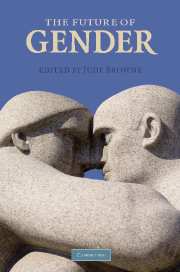Book contents
- Frontmatter
- Contents
- List of figures
- List of tables
- List of contributors
- Acknowledgements
- Introduction
- Part I Reorienting the feminist imagination
- Part II Variations on the theme of gender
- 4 Does biology play any role in sex differences in the mind?
- 5 Sex and the social construction of gender: can feminism and evolutionary psychology be reconciled?
- 6 ‘Trans’ trouble: trans-sexuality and the end of gender
- 7 Gender and social change
- 8 Procreative mothers (sexual difference) and child-free sisters (gender)
- Part III Gender and political practice
- Index
- References
7 - Gender and social change
Published online by Cambridge University Press: 05 June 2012
- Frontmatter
- Contents
- List of figures
- List of tables
- List of contributors
- Acknowledgements
- Introduction
- Part I Reorienting the feminist imagination
- Part II Variations on the theme of gender
- 4 Does biology play any role in sex differences in the mind?
- 5 Sex and the social construction of gender: can feminism and evolutionary psychology be reconciled?
- 6 ‘Trans’ trouble: trans-sexuality and the end of gender
- 7 Gender and social change
- 8 Procreative mothers (sexual difference) and child-free sisters (gender)
- Part III Gender and political practice
- Index
- References
Summary
How in the context of the currently developing global order (and consequent ever-changing local political frameworks) might feminists most sensibly seek to transform the gendered features of society in such a manner as to facilitate a less discriminating scenario than is currently in evidence? This is a question that motivates much of the thinking behind this book. But posing it carries certain presuppositions. In particular it takes for granted the notion that gender is a meaningful as well as useful category of analysis. And it presumes, too, that, whatever the socio-political context, it is always feasible to identify some forms of emancipatory practice, at least with respect to gender discrimination. Or at least there is an assumption that such emancipatory practice is not ruled out in principle. Both sets of presuppositions have been found to be problematic. Specifically, various feminist theorists hold that there are conceptual and political difficulties to making use of the category of gender in social theorising (see e.g. Bordo 1993; Spelman 1990). And the reasoning behind such assessments tends in its turn to be destabilising of the goal of emancipatory practice.
In this chapter I focus on these latter concerns rather than the more specific question posed at the outset. For unless the noted difficulties can somehow be resolved any further questioning of appropriate local and global strategies appears to beg too many issues.
- Type
- Chapter
- Information
- The Future of Gender , pp. 136 - 162Publisher: Cambridge University PressPrint publication year: 2007
References
- 10
- Cited by



